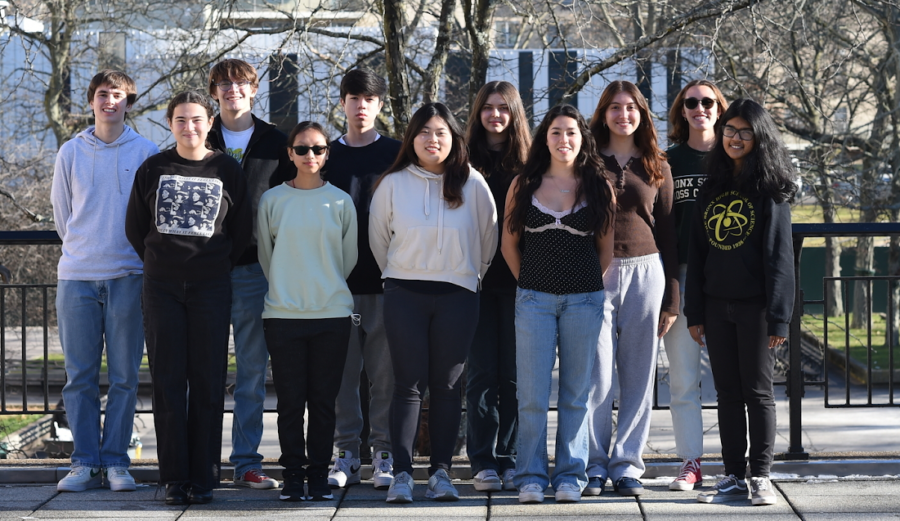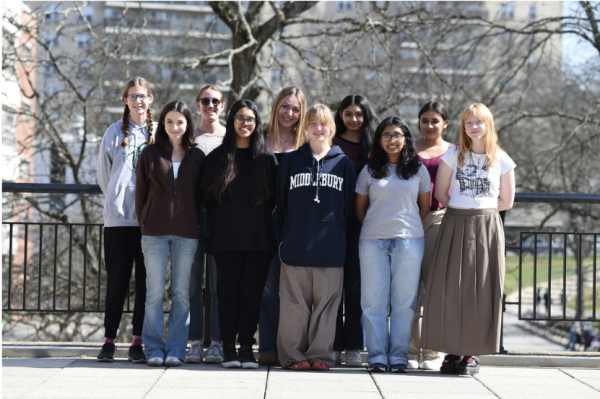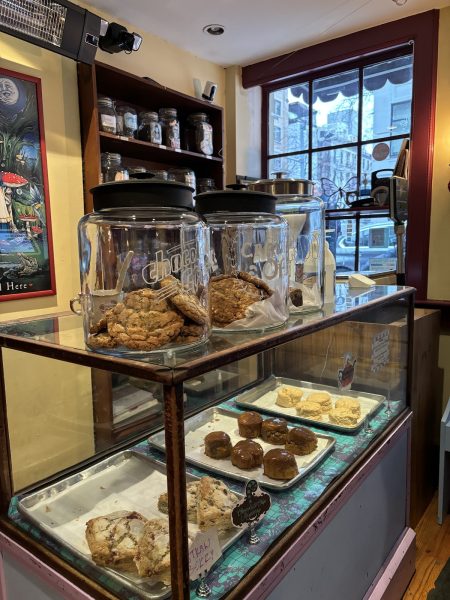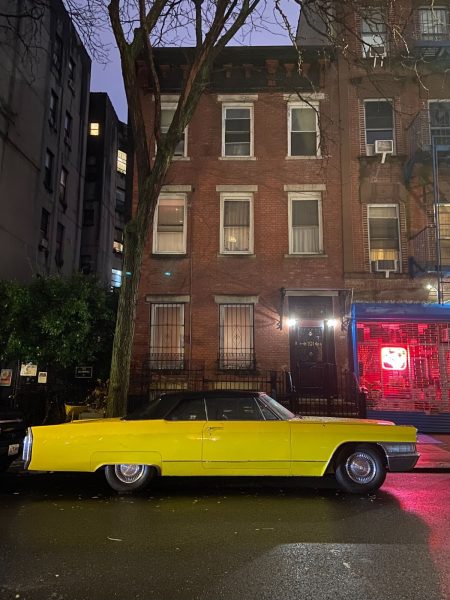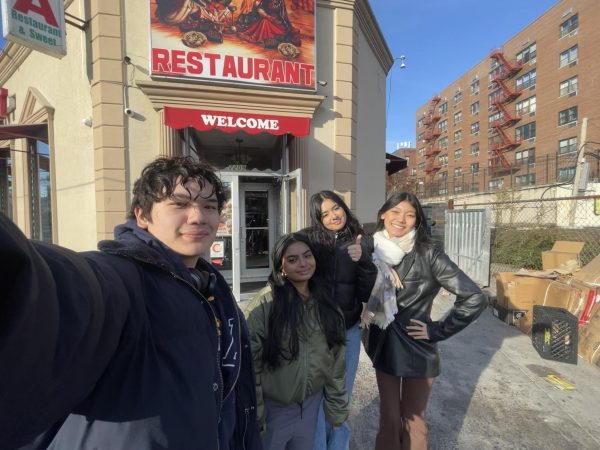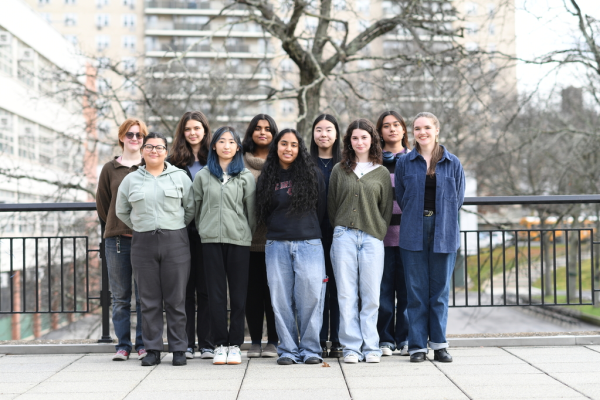January 2023 Advice Column: Improving Your Work Over the Winter
The Copy Chiefs, Managing Editors, and Editors-in-Chief of ‘The Science Survey’ are here to answer your questions about improving your opportunities in and out of the classroom during this season of transitions.
Managing Editors, Copy Chiefs, and Editors-in-Chief of ‘The Science Survey,’ the writers of this January 2023 Advice Column, pose for a photo. Depicted above from Left to Right are Donna Celentano ’23, Camila Kulahlioglu ’23, Rahm Rodkey ’23, Valentino Sella ’23, Hallel Abrams Gerber ’24, Sydney Lee ’23, Khado Tsephel ’23, Oliver Whelan ’24, Lily Zufall ’24, Kate Hankin ’24, and Niha Roy ’23.
Hello, Bronx Science!
We, the Copy Chiefs, Managing Editors, and Editors-in-Chief of The Science Survey, are so proud of you for navigating your coursework throughout the first semester. You’re in the final stretch as we head towards Uniform MidYear week. There have been amazing accomplishments and somewhat stressful situations, even an influx of different illnesses (COVID-19, RSV, and the flu), but you made it! As you continue through your journey at Bronx Science during the winter months, we are here to support you, lending our advice and experiences to make this time easier for you. We have insights (in the following order) regarding preparing for Uniform MidYear Exams, choosing classes, forming connections, gaining in- and out- of school opportunities, and preparing for your future. May it relieve stress and bolster you in your decision-making.
With all of our love,
Donna Celentano ’23, Camila Kulahlioglu ’23, Rahm Rodkey ’23, Valentino Sella ’23, Hallel Abrams Gerber ’24, Sydney Lee ’23, Khado Tsephel ’23, Oliver Whelan ’24, Lily Zufall ’24, Kate Hankin ’24, and Niha Roy ’23
How do I best study for Uniform MidYear Exams?
Rahm: This one’s a little tough since the last time Bronx Science held Uniform MidYear Exams was three years ago. But here’s my best shot:
First of all, reach out to your teacher. Your Uniform MidYear Exams are going to look a lot different in each class, so you should make sure you have a topic list or at least some general idea of what you’ll see on all of them — there’s no need to try and guess what might be on the test yourself.
Secondly, prioritize the subjects covered that are from earlier in the year: most of your classes will probably have become more challenging with time, but it’s still easy to forget the simpler topics. Getting questions wrong because you didn’t take ten minutes to review the first topic of the year is one of the worst ways to lose points.
Third, know that just reading your notes isn’t enough. This one goes for any test, not just for Uniform MidYear Exams, but it’s still worth mentioning: if you’re studying for a math or physics class, complete practice problems. If you’re studying for science or social studies, write down the things you need to know by hand — you’ll remember your notes way better if you copy them down than if you read them over and over.
Finally, don’t stress — Uniform MidYear Exams might be more important than most of the tests you take, but they’re not going to affect your high school career in the long term. It’s not worth sacrificing your mental health just to get a slightly higher grade on your chemistry Uniform MidYear Exam. And definitely don’t pull an all-nighter studying the night before — getting sleep is the most important thing you can do to prepare yourself for a test and to help manage stress levels.
How should I decide which classes to choose for next academic year? How do I find the classes that are most interesting to me?
Khado: On Friday, March 4th, 2023, Talos will open at 2:00 p.m., where you can then choose which courses you want to take next year. Note: The link to Talos is not on the Bronx science website, but you can easily find it using this link. Students should use their Bronx science e-mail and OSIS number as their username and password to log in.
Through Talos, you will see a list of all the pre-approved courses. If you wish to take a class that you have not already been preapproved for you can submit an appeal through Talos. To submit an appeal, you must select the course you wish to take and write a brief paragraph explaining why you were not pre-approved for this class, why you wish to take this class, and why you think you’re a fit for this class.
If you’re unsure of which classes you want to take, you can look at the Bronx science course guide. All of the courses Bronx science offers are listed. Underneath each course is a short description and requirements of the class.
Choosing classes for next year requires knowledge of what each course entails, so talking to students who have already taken this class is a great way to find out more information beyond what’s on paper. Your Guidance Counselor is also a great resource with whom you can discuss various options. Using their experience guiding past students, they can help you choose courses they believe are best fit for you based on the difficulty and workload of the class.
How can I successfully create/promote change in the school?
Oliver: As high schoolers, it might seem like we can’t create change, both in — and out — of school. However, it’s actually the opposite. There are many opportunities students can take advantage of. Yyou just have to know where to look.
Clubs
You’ve probably heard messages from Clubs during the morning announcements, seen their posters in the hallways, and most importantly, been affected by the changes they have made. These student-run institutions are a perfect way to interact with people with similar interests and aspirations, in order to create change on topics ranging from climate to social issues to volunteering. All clubs are open to everyone, so you can always join or stop in to see which ones work for you. And if you don’t find anything you like, you can always create your own club. There are always people out there who share your ideas, especially in a school this large, so don’t be afraid to try to start one. Clubs can be a great way to get involved with the community and make change in school. The Bronx Science School Administration is always listening to suggestions that clubs have, so this is a great way to connect with the means you need to inspire change.
Petitions
Petitions can help create change in almost every circumstance, including in school. Students have used this many times before, in order to advocate for school events. Our school’s administrators and teachers truly do listen to the needs of their students. Even if you don’t have a large number of people who support your cause, simply reaching out to school staff could very well create the change you need. The people at the school – administrators, teachers, and students – are all here to help and support each other. Simply reaching out really goes a long way, and you’d be surprised about the amount of change you’re able to create just by talking to administrators!
Social Media
We all know of the potential that social media has to spread information to a wide variety of people. Just by going on your phone and reposting something you believe in, such as advocating for slowing down global warming, hundreds of people will be exposed to your ideas. Although this might seem as a more passive attempt at creating change, when people see many others agreeing with an idea, it affirms that idea. As a result, they become more inclined to believe your ideas, and might even feel compelled to carry out your ideas when they return to school. I have been influenced by many of these online campaigns for change, like the recycling and composting bins at lunch. Just remember that no matter how small, every attempt to create change is a valid one, and you never know unless you try.
What can I do to recover from writer’s block while writing for English or History classes?
Camila: The American novelist and journalist Norman Mailer once said, “Writer’s block is only a failure of the ego.” Many students associate high performance in school and contemporary society with talent or genius because it is easier to take pride in our successes and find justification for our failures than admit to making mistakes.
At Bronx Science, where many students get caught up in this thought process and view writing and academic endeavors through a lens of ‘genius or failure,’ this holds especially true. You either got the A plus, or you failed; you produced the most interesting piece, or you did poorly. But writing, specifically creative writing, is almost always in a shade of gray.
Whether you have writer’s block for fiction or nonfiction writing, the root of the problem is a lack of confidence or knowledge on your subject. If you are writing for The Science Survey, it is important to be well-versed on your topic, and revisiting background information and research will improve your self-trust in starting the piece. I find that, when writing profiles, the best way to begin is by introducing an anecdote on your subject to get comfortable with your writing and discover the tone that best suits your subject.
In contrast, if you are writing fiction for your creative writing unit in English, opening with an ordinary sentence can help set a scene in your piece. Virginia Woolf’s revered novel, To the Lighthouse, simply starts with, “‘Yes, of course, if it’s fine tomorrow,’ said Mrs. Ramsay.” In class, we associate great works of literature with captivating beginnings, but it can be just as impressionable to start small and create a larger theme or focus from the scenario.
In short, overthinking your introduction, lede, or even first sentence will only worsen writer’s block and make the task much more challenging. Instead, it is more productive and manageable to work at producing content and not focus on high-caliber writing until there is enough tangible substance on the page to develop an outstanding piece of writing. As John McPhee, a renowned non-fiction profiler who is notorious for writing detailed and lengthy books, stated in an interivew, “If you put a drop in a bucket every day, after three hundred and sixty-five days, the bucket’s going to have some water in it.”
How can I find other students that share the same academic interests as me?
Lily: As is the answer for most questions about finding your people at Bronx Science, try out some clubs! There are a lot of relatively low commitment clubs related to a variety of academic topics where you can meet people with similar interests as you. You can look through the club list and pick out a club or two that appeals to you, whether that ends up being History Club or Astronomy Club.
Starting in your sophomore year, you’ll have some choice in your academic schedule, which I would recommend you use to take classes that genuinely interest you instead of just loading up on Advanced Placement classes. In addition to making your schedule more enjoyable, you’ll get to meet people who share interests with you. Reach out to the people in all your classes, but especially those in your electives, as you likely have a lot in common with those people.
At the end of the day, you have to be willing to reach out to the people in your classes and clubs and make an active effort to make friends. Placing yourself in a room with people you share interests with is only half of it — you also have to act the way you would in any social situation and be friendly with your classmates. It can be intimidating if you don’t know anyone, but so worth it!
How can I extend friendships beyond the classroom environment?
Kate: In my opinion, there are two types of friendships: common interest friendships and life friendships. Common interest friendships are what they sound like, friends that discuss the passions they share. Life friendships are ones where the two friends discuss their lives, values, future plans, emotions, and beliefs. These friendships are based on a mutual love of each other’s company no matter the situation. Common interest friendships are great for classes or clubs but aren’t ideal for other situations because, eventually, the friends will run out of things to talk about. Life friendships do not have this problem; life is ever changing, so life friends will always have lively discussions. The question then becomes how to bring potential life friendships out of the classroom.
The obvious answer to this question is to start discussing your lives and bringing up substantive prompts. I have always loved prompts more than questions. Prompts begin discussions and don’t have set answers, while questions usually have set boundaries. Some of my favorite prompts are about the types of friendships people prefer, groups or pairs, where people think it is worth it to spend money, good or experiences, etc. Once you’ve discussed a fair amount of your thoughts with each other, you should start to feel more comfortable together. This should make it much easier to ask them to hang out outside of school.
You don’t need to make elaborate plans, or do a certain activity, just walking around a cool area or even your own neighborhood and talking is a great activity for people that make a good pair. It’s important to remember that no one will judge you for asking them to hang out, as people are too focused on their own insecurities and will most likely be flattered. Plus, the worst that can happen is they say no, and you find a new friendship prospect. Happy friend making!
What are some scholarship websites I could go onto to apply and when is the best time to apply to them?
Hallel: There are many scholarships year-round! Applications for anything can be stressful and time consuming, be it a summer program, college, scholarship, or other. But they’re definitely attainable. There are different types of scholarships depending on what you are looking for, interested in, and involved in. Some may have ties to personal identity, others to socioeconomic status, and more to educational interests or career paths. Seniors, especially, are open to a multitude of opportunities. Most scholarships are released late June and close by early December, but some resources expand into the school year and release incredible sums of money. Niche, for instance, has even held a $50,000 no-essay scholarship that recently closed.
Different scholarship applications expect different amounts of work. It may seem easier to apply for no-essay scholarships, however, those with essays receive fewer entries making it easier for you to win (you can even reuse prompts). For reference, most scholarships simply ask you to express yourself in a couple hundred words, and they set you up to gain amazing opportunities. Never be afraid to pick up that pen (or technically keyboard)!
You already have access to some of the best scholarships at your fingertips. CollegeBoard has the BigFuture program that gives you access to some incredible opportunities. Many universities will offer scholarships in the forms of academic, athletic, extracurriculars, student specific, need-based, employer, military, STEM, and major-based aid. The resources are out there for you to find.
Some amazing general sources for scholarships are listed below as a starting point:
Scholarships.com uses criteria like GPA, artistic ability, and many other subcategories to find personal and specific scholarships you are likely to win.
Fastweb provides scholarships notifications/e-mail updates and has scholarships with a range of applicant pools and specificities.
ScholarshipOwl is very organized and automatically resubmits you to recurring scholarships.
Going Merry allows you to apply for multiple scholarships at once and provides smaller awards along with national scholarships.
Peterson’s offers what they call “World’s Easiest Scholarship” for $2,500 and helps you access test prep, too.
Bold.org is easy to navigate for many types of scholarships and has a “no essay” function.
Cappex has the largest collection of scholarships.
CareerOneStop offers more than 8,000 scholarships from the official website of the U.S. Department of Labor.
Chegg – from textbook solutions to more than 25,000 scholarships, this website has it all.
Unigo yields 3.6 million scholarships and grants, helps with the college process, and gives student loan information.
The Scholly algorithm provides scholarships for you but charges money.
You are qualified, you are deserving, you are prepared, and you can do this! Trust yourself and your skills and never stop looking for resources. As the Canadian writer Robin S. Sharma said, “As you move outside of your comfort zone, what was once the unknown and frightening becomes your new normal.”
What are some ways to obtain volunteering hours (from the school, within my community, etc.)?
Sydney: As all students are probably aware of, volunteering is an amazing way to contribute to your community while doing good deeds! There are many opportunities to gain volunteering hours inside and outside of Bronx Science.
At Bronx Science, there are many school events that fill hours and allow students to help, such as volunteering to help with school plays, performances, and events. You could contribute your help at these events and then request a verification letter from the advisor that you assisted for a certain number of hours. But aside from them, there are also times when teachers or departments need help in order to organize materials, which can also be considered for volunteering credit.
For in school volunteering hours, there is also the enticing option to join the Bronx Science National Honor Society which provides you with a lot of chances to volunteer for school-related events. This includes open houses, SHSAT tutoring, SHSAT volunteering, seasonal events, and more! You may join the NHS in junior or senior year if you meet the requirements.
For outside volunteering hours, there are many options online. By searching up the field of volunteering you would like to do and your location, many opportunities will show up that match your criteria. For example, you would search “animal volunteering opportunities in nyc for high school students” if you are interested in working with animals.
The website NYC Service is the go-to website for volunteering in New York City, and you will find an abundance of opportunities in many different categories!
How does the school prepare us for college applications, and what do I need to begin the process myself?
Donna: The most useful resource I have been able to take advantage of at Bronx Science is the community. Unlike many other schools, the cooperative and constructive nature of our school community makes the college application process that much less stressful and isolating. The student body is a pool of knowledge that comes together to help one another when someone is confused, questioning, or just curious. From my personal experience, most students are more than willing to share and help one another out.
One of the most beneficial yet under-appreciated resources that our Guidance Counselors provide is a bright yellow paper schedule with all the important deadlines. These are handed out during one of the first college meetings. The counselors provide a lot of liberty in terms of the college application process, but this is not to say they are not there to help. During my first visit, my counselor was ready with schools she thought would be a good fit for me, which gave me extra time to research them!
In terms of personal initiative, I would say the most important thing is to start organizing your materials the summer before your senior year. For example, I created my own personal spreadsheet with prospective schools I was thinking of applying to and their components: tuition, whether I would be applying early or regular, how many, if any, supplemental essays were required, and such. I would also recommend starting the common application early, or at least familiarizing yourself with the website the weeks before senior year starts, as you will have less free time than anticipated. Just familiarizing yourself with all of the significant platforms is a great way to help mitigate any stress during the actual application process.
If you are nervous about missing deadlines, fear not because at the beginning of the year the counselors come together to present a slideshow with all important dates and information and even share it with all students on their Naviance. The counselors even set earlier deadlines for specific materials to ensure that every student is prepared and ready to submit when the real deadlines set by the schools are due.
Overall, I think that Bronx Science does a good job with preparing the materials, but it is a matter of how much time you spend on your own becoming familiar with the process and schools, that determines a large part of how the college process will go for each student.
What is a good way to prepare for writing college essays and supplemental essays?
Valentino: The most important thing to remember is not to panic! College essays can feel like big, important challenges that have the potential to determine your future, and many students (like me) are uncomfortable writing about themselves under so much pressure. Even though it may seem intimidating, the best way to prepare to write these essays is to actually write them!
First, you should engage in some research about the schools you might want to apply to. Familiarize yourself with what various colleges have to offer and make a list of the things you like about each of them. College research is important for a lot of reasons, but when it comes time to put pen to paper and write supplemental essays, knowing a lot about the colleges you want to attend can go a long way. If you have any specific questions that Google can’t answer, consider reaching out to a representative from the school or talking to your guidance counselor for more information.
After you’ve done some research, start casually writing some essays! Try to complete as many drafts as possible and have some people (parents, teachers, friends, and your guidance counselor) give you feedback about how to improve them. At this point, don’t worry too much about the quality of the essays; just try to get something on paper. It’s especially helpful to complete a draft of your Common Application essay as soon as possible so that you can spend time polishing it into the best essay it can be. Remember to maintain your own voice even after you have others edit. Writing essays for college applications is unlike any kind of writing that most students have done before, so start early and get lots of practice!
How can I overcome my fear of asking teachers for letters of recommendations for internships over the summer?
Niha: I assure you that the anxiety before asking for a recommendation is common. Personally, I held off asking my teachers for a week because I feared rejection. Then, I thought about which teacher would accurately write about me in their letter. I soon realized that any teacher I intended to ask would be aware of who I am both as a student and as a person, so there would be no need to worry. When asking for your recommendation, you could start by having a relaxed conversation with your teacher, so you are not as stressed when asking if they would be willing to write the letter for you. The most important part about overcoming your fear is making sure you are in a comfortable environment when requesting.
Asking for letters of recommendation for summer internships should never be left for the week before the last day of school. Giving your teachers enough time to write a recommendation is key to teachers agreeing to write your recommendation. Ask your teachers in-person and possibly during SGI, so the environment doesn’t overwhelm you while surrounded by your peers. If you decide to ask over e-mail, you should make sure that your e-mail is not overly informal. Your e-mail should start with a greeting and end with gratitude. You should mention why you are applying to this internship whether you ask in person or via e-mail. Your passion towards this internship should shine during your conversation or your e-mail to ensure that your teachers understand how important this internship is to you. And if you send an e-mail, make sure to follow up with an in person conversation with your teacher, as well.
The teacher you ask for your recommendation should be an individual with whom you have had conversations about your interests before. At the very least, this teacher should be someone you’ve had conversations with, during class time and/or during SGI. Asking a teacher who’s never heard your voice during class discussions or your ideas will be unable to write a recommendation that reflects who you are as a student or as a person. To ensure that your recommendation is submitted by deadline, remember to follow up with teachers to remind them about the importance that this internship has for you.
Good Luck, and set yourself up for success!
As John McPhee, a renowned non-fiction profiler who is notorious for writing detailed and lengthy books, stated in an interivew, “If you put a drop in a bucket every day, after three hundred and sixty-five days, the bucket’s going to have some water in it.”
Donna Celentano is an Editor-in-Chief for 'The Science Survey.' As an Editor-in-Chief, she helps manage her peers’ work, providing helpful and informed...
Camila Kulahlioglu is an Editor-in-Chief for ‘The Science Survey.’ She hopes that her writing will inspire her peers to find new literary passions...
Rahm Rodkey is an Editor-in-Chief for 'The Science Survey.' He enjoys how journalistic writing is able to connect people on a global scale, and that it...
Otho Valentino Sella is an Editor-in-Chief of ‘The Science Survey.' Otho has always been fascinated by stories and storytelling, and he sees journalistic...
Hallel Abrams Gerber is an Editor-in-Chief for ‘The Science Survey,’ using her writing to represent a myriad of social issues and innovations, bolster...
Sydney Lee is a Copy Chief for ‘The Science Survey.' She finds journalistic writing very interesting because of the variety of topics that it can cover....
Khado Tsephel is a Copy Chief for ‘The Science Survey.' In her free time, she enjoys reading and listening to music. In college, Khado wants to pursue...
Oliver Whelan is an Editor-in-Chief for ‘The Science Survey.’ He enjoys journalistic writing because of its ability to convey information on topics...
Lily Zufall is an Editor-in-Chief of ‘The Science Survey.’ To her, the most appealing part of journalistic writing is being able to walk the line between...
Kate Hankin is an Editor-in-Chief for ‘The Science Survey.’ In her journalistic writing, Kate likes to share her interests such as food, music, current...
Niha Roy is a Managing/Advisory Editor and a Staff Reporter for ‘The Science Survey.' She enjoys writing articles about issues and groups of people whom...
Pritika Patel is an Editor-in-Chief for ‘The Science Survey.’ She believes that journalism serves as the vital connection between people and the world...

